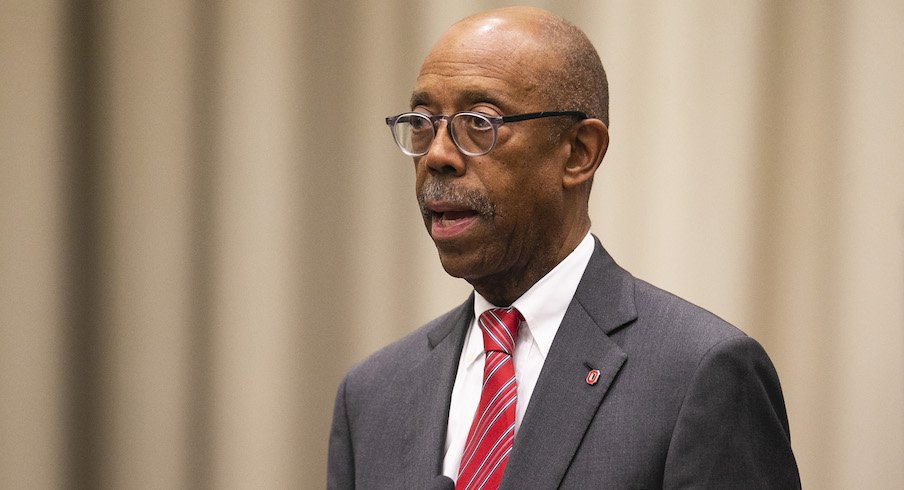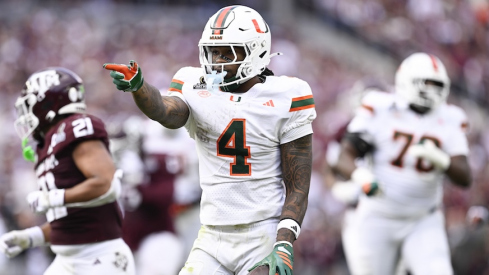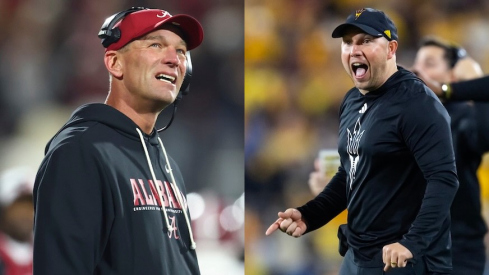While testifying at a Senate subcommittee hearing on Wednesday morning, Ohio State president emeritus Michael Drake faced multiple questions about the “Buckeye Pledge” signed by OSU student-athletes last month.
In response to a query from Sen. Maria Cantwell (D-WA) who described the document signed by Ohio State student-athletes as a “liability waiver,” Drake – who concluded his tenure as Ohio State president on Tuesday but is still the chairman of the NCAA's Board of Governors – refuted that description and, as athletic director Gene Smith and other Ohio State representatives have said previously, said the Buckeye Pledge will not used as a legal waiver for the university.
“They did not sign a liability waiver. That's not true. It's a pledge that all of our students are going to be signing to basically follow the good public health guidelines that you and I and everyone should follow to help protect us against the pandemic,” Drake said. “In fact, the guidelines are exactly parallel to the CDC-issued guidelines that came out just yesterday. And what the pledge says is that you'll wear a mask when you're in public, you'll wash your hands, you'll keep six feet of distance and if you become ill, you'll report this to people to allow you to be protected.
“Specifically in the pledge, it says that whether or not you participate will not affect your scholarship, so it's a pledge not a waiver, which I would not support.”
Upon further questioning about the Buckeye Pledge from Sen. Richard Blumenthal (D-CT) – who introduced legislation along with fellow Sen. Cory Booker (D-NJ) on Tuesday that would prohibit athletes from being required to sign liability waivers related to COVID-19 – Drake said “I don't support a waiver or an assumption of risk in a legal sense” and said Ohio State has not asked its athletes to waive any legal rights by signing the pledge.
Blumenthal: “So on behalf of Ohio State University, if any athlete ever sued your institution, you would say no rights have been forgone or waived or sacrificed?”
Drake: “I certainly would say that.”
[...]
Blumenthal: “I hope your laywers agree with that.”
Drake: “I hope so too.”
Per the Safe and Healthy Buckeyes website that was launched by Ohio State on Wednesday to provide information about students' return to campus for in-person classes this fall, all members of the university community “including students, faculty, staff, administrators and visitors” will be required to sign a pledge “to affirm their understanding of what is needed to help fight the spread of the virus and their intention to do their part. Accountability measures will be in place for those who refuse to abide by required health and safety guidelines.”
Drake was also asked whether he believes colleges should be required to disclose how many COVID-19 cases are diagnosed at their schools. While Drake expressed that the NCAA's Board of Governors would not be in position to enact such policies, he said he believes it is appropriate for universities to report that information.
“I think that disclosing information is useful,” Drake said. “I believe it's appropriate for the schools to report, and with proper privacy protections for the individuals in place, I think that's a reasonable thing.”
Thus far, Ohio State has declined to release the results of its athletes' COVID-19 testing, citing the possibility that it could lead to the identification of specific individuals if there are positive tests, even though many other athletic departments around the country have released testing results for their athletes and staff. Drake noted Wednesday that “HIPAA and other issues are in effect” when asked about the possibility of schools being required to release that data.
While some of the questions asked by members of the Senate Committee on Commerce, Science and Transportation on Wednesday were about the COVID-19 pandemic about how universities are handling that with their students and specifically athletes, the primary purpose of Wednesday's hearing was to discuss the issue of name, image and likeness benefits for college athletes, as the NCAA moves toward allowing athletes to profit from their name, image and likeness beginning next year.
Among Drake's comments on that topic, one that generated reaction on social media was when he suggested that only a small number of Ohio State athletes would receive endorsement deals under the new NIL guidelines.
“We've heard about group licenses, which would be a different thing which would potentially benefit more,” Drake said. “We think that the real potential might be for, again, a handful, three or four students might be able to do commercials or those kinds of things.”
Many people believe, though, that a much larger number of college athletes will ultimately be able to profit off their name, image and likeness as social media influencers or through other similar avenues.
“I think the car dealership, hometown hero model is an outdated model,” University of Baltimore law professor Dionne Kellor said during Wednesday's hearing. “I think when we have discussions about this, we tend to focus on the super, superstars in the revenue-generating sports, and I think what's exciting about name, image and likeness legislation is that this opens up new frontiers ... People can become stars on the Internet that maybe aren't stars that you and I always see, and so I think actually there are many, many more athletes that could capitalize on these rights.”


